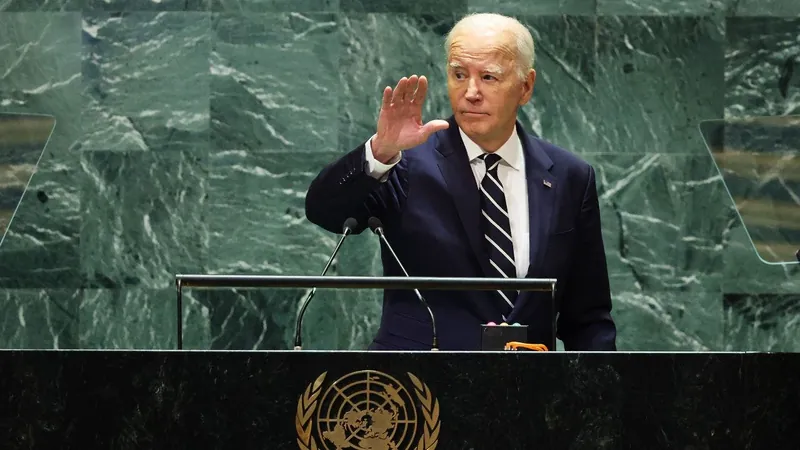
Biden’s UNGA Speech: A Global Wake-Up Call to America’s Diminished Influence
2024-09-25
In a pivotal moment at the United Nations General Assembly (UNGA), President Biden’s address was a sobering reflection of perceived American weakness and the controversial foreign policies of his administration.
As Iran continues to be identified as a leading state sponsor of terrorism, Biden devoted only a fraction of his lengthy speech to the topic, reiterating his assertion that Iran will never acquire a nuclear weapon. This statement clangs hollow, especially given that the International Atomic Energy Agency has indicated that Iran is on the brink of becoming a nuclear state under Biden's watch.
Instead of addressing threats from nations like Iran comprehensively, Biden found himself spending more time discussing the situation in Gaza than addressing myriad global conflicts. While this focus could be seen as necessary, it raises questions about the priorities of the U.S. administration. In ignoring the plight of other regions and nations suffering from violence, he may have inadvertently reinforced the narrative that Israel remains the focal point of global discourse about injustice.
His comments on the Middle East highlighted an imbalance in narrative; Biden called for alleviation of suffering in Gaza but neglected to mention the ongoing distress faced by innocent Israelis living under the threat of violence. The families of Israeli Defense Forces members, who bravely confront threats daily, were left unacknowledged. The unjust horrors they endure, especially in the face of continuous rocket fire, were overshadowed by Biden’s almost exclusive attention to Palestinian suffering.
The complexities of regional conflicts were further compounded when Biden discussed the situation along the Israeli-Lebanese border. While he pointed to the plight of displaced Lebanese citizens, he failed to recognize the significant displacement of Israelis caused by aggression from Hezbollah and Iran. With thousands of Israelis forced from their homes due to repeated, unprovoked attacks, this omission speaks volumes about the moral ambiguities permeating his speech.
Moreover, President Biden’s address to the assembly did not adequately confront the troubling rise of antisemitism globally—a critical issue that resonates strongly in today’s geopolitical climate. With antisemitic sentiment gaining traction and being, in some cases, encouraged by narratives circulating in international forums like the UN, Biden’s silence on this matter is conspicuous. This oversight not only disarms the U.S. position against such hatred but also undermines the country's commitment to a stance of tolerance and peace.
In his final address at the UNGA, Biden had an opportunity to advocate for genuine accountability within the UN, challenge its frequent bias, and underscore the importance of open discourse on antisemitism and tolerances worldwide. Regrettably, he opted instead for generic appeals to “common hope” and “cooperation”—messages that, while well-meaning, are often spoken by leaders who do not have the interests of peace and equality at heart.
As geopolitical dynamics continue to shift, Biden’s address serves as a clarion call for leaders worldwide to recognize the fragility of America’s standing in global affairs, urging a critical reassessment of strategies that prioritize equity over historical realities and political correctness. If the global community hopes to cultivate a truly peaceful future, it is imperative that we confront uncomfortable truths and ensure that crucial issues are not obscured by platitudes.




 Brasil (PT)
Brasil (PT)
 Canada (EN)
Canada (EN)
 Chile (ES)
Chile (ES)
 España (ES)
España (ES)
 France (FR)
France (FR)
 Hong Kong (EN)
Hong Kong (EN)
 Italia (IT)
Italia (IT)
 日本 (JA)
日本 (JA)
 Magyarország (HU)
Magyarország (HU)
 Norge (NO)
Norge (NO)
 Polska (PL)
Polska (PL)
 Schweiz (DE)
Schweiz (DE)
 Singapore (EN)
Singapore (EN)
 Sverige (SV)
Sverige (SV)
 Suomi (FI)
Suomi (FI)
 Türkiye (TR)
Türkiye (TR)